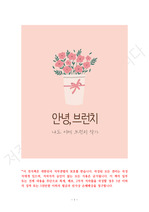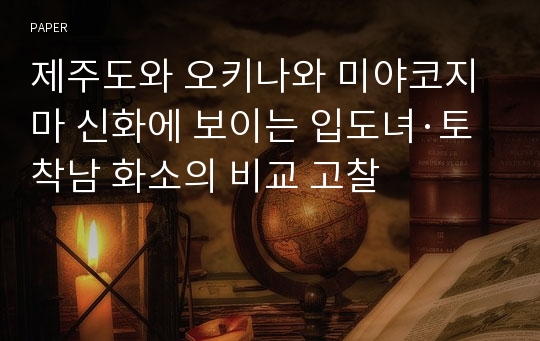제주도와 오키나와 미야코지마 신화에 보이는 입도녀·토착남 화소의 비교 고찰
* 본 문서는 배포용으로 복사 및 편집이 불가합니다.
서지정보
ㆍ발행기관 : 한국구비문학회
ㆍ수록지정보 : 구비문학연구
ㆍ저자명 : 정진희
ㆍ저자명 : 정진희
목차
1. 머리말2. 입도녀·토착남 혼인 화소의 실제
3. 입도녀·토착남 혼인 화소의 신화적 의미
4. ‘외부’에 대한 신화적 관념과 현실적 인식
5. 맺음말
한국어 초록
제주도 당신본풀이에는 입도녀와 토착남의 혼인 화소가 종종 등장하는데, 제주도와 유사한 지리적·종교적·역사적 환경을 지니고 있는 미야코지마의 신화에도 이러한 화소가 보인다. 입도녀와 토착남의 혼인이 결국 별거로 귀결된다는 점에서 유사하지만, 그 구체적 양상에 있어서는 차이점을 보인다. 미야코지마의 신화에서는 입도녀와 토착남이 각각 신과 인간인 데 비해 제주도 신화에서는 입도녀와 토착남 모두 신격이라는 점, 미야코지마에서는 입도녀가 원래의 자리로 ‘귀환’하는 데 비해 제주도 신화에서는 입도녀가 제주도 내부의 신으로 자리하게 된다는 점 등이 그것이다.입도녀와 토착남의 혼인 화소가 중심이 되는 제주도의 신화는 제주도와 제주도 밖을 각각 내부와 외부로 구분하여 그 둘 사이의 역사적 관계를 설명하는 일종의 역사 담론적 성격도 간취된다. 이에 비해 미야코지마의 신화는 신과 인간의 관계를 시원적 사건을 통해 설명하는 신앙 담론으로서의 신화라는 전형성을 드러내고 있다고 보인다.
영어 초록
This research is a comparative study of the holy marriage between the female from over the sea and the native male in the myths of Jeju-island and Miyakozima. It analyzes the myths having this motif and discusses the mythological meaning of it.In the myths of Jeju, the female deity is the symbol of advanced culture or magical power which is origined from the external. And the native male deity means the internal that is confronted by the external. The marriage shows that the internal accepts the exteranl, and the divorce which is the end of that marriage shows how the accepted external influence is settled into the internal system. I think that such marriage myths have been telling the history between Jeju and its external.
In the myths of miyakozima, the groom is not a deity but a human being. The marriage with the female deity means that she gives the blessing and divine fertility to him. In the end of the myths, She goes back home and he becomes to the ancestor of people, who make sacrfices to not only him but also her as the goddess in the origin of blessing power. So, I think that these myths are telling how man become to blessed with divine fertility.
Consequently, I can conclude that the meanings and features of marriage mytheme in Jeju and Miyako differ from each other. The 'over the sea' is the space of divinity and blessing in Miyako's, but it is 'the external' in Jeju's. I consider the myths containing this mytheme as a kind of discourse. The myth of Miyako is regarded as a discourse about religious origin, but of Jeju, it can be regarded as a discourse about history.
참고 자료
없음"구비문학연구"의 다른 논문
 침향산(沈香山) 조설방식의 특성과 연행양상33페이지
침향산(沈香山) 조설방식의 특성과 연행양상33페이지 거짓말 딜레마와 이야기의 역설 : 설화 <거짓말 세 마디로 장가든 사람>의 이해31페이지
거짓말 딜레마와 이야기의 역설 : 설화 <거짓말 세 마디로 장가든 사람>의 이해31페이지 <장자못 전설>의 전파력 연구 : <돌부처 눈 붉어지면 침몰하는 마을> 설화와의 비교를 중심으로27페이지
<장자못 전설>의 전파력 연구 : <돌부처 눈 붉어지면 침몰하는 마을> 설화와의 비교를 중심으로27페이지 구비문학에 나타난 부친탐색 원형36페이지
구비문학에 나타난 부친탐색 원형36페이지 구비문학에 나타난 꽃 원형 : 이야기와 본풀이를 예증삼아24페이지
구비문학에 나타난 꽃 원형 : 이야기와 본풀이를 예증삼아24페이지 中國 幻夢說話에 나타난 時間의 原型24페이지
中國 幻夢說話에 나타난 時間의 原型24페이지 희생제의 설화의 원형성 연구 : 인신공희 설화 중심 24페이지
희생제의 설화의 원형성 연구 : 인신공희 설화 중심 24페이지 구비문학에 나타난 부녀관계의 원형 : ‘집 나가는 딸’ 유형의 설화를 중심으로22페이지
구비문학에 나타난 부녀관계의 원형 : ‘집 나가는 딸’ 유형의 설화를 중심으로22페이지 민담의 서사 구조적 원형과 그 의의22페이지
민담의 서사 구조적 원형과 그 의의22페이지 구비서사에 나타난 ‘말’의 원형적 성격20페이지
구비서사에 나타난 ‘말’의 원형적 성격20페이지

























